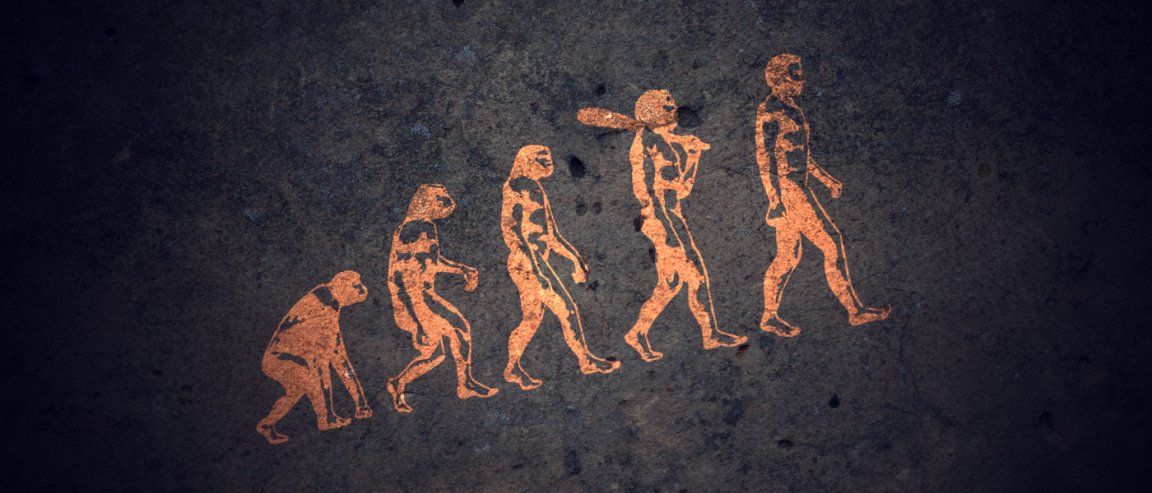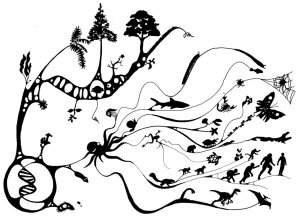
While an open and honest debate is always a good thing, most of the time, when people are pointing out “problems” in evolution, their qualms arise from a misunderstanding of what evolution actually is and how the mechanisms of evolution actually function.
Below are some of the most common misconceptions (or questions) in evolution and how science answers these concerns.
Q1.) How does evolution explain the origins of life?
A.) This question, and variations of it, is one of the most common things that people turn to when trying to refute evolution—It can’t reliably predict how life first originated.
In truth, evolution doesn’t explain anything about how life originated. Is this a problem with evolution? Nope. Evolution isn’t trying to explain how life started. To complain that evolution doesn’t explain the origin of life is like complaining that the gas laws don’t explain gravity.
How life originated is something completely different, called abiogenesis. What evolution does try to explain (and does a good job of explaining) is how life developed over time, diversified, and continues to develop and diversify. You see, evolution starts from the assumption that life is already there, and it has nothing to do with how it got there. Therefore it isn’t a flaw that evolution does not explain abiogenesis; that is a completely separate discussion.
Q2.) How could random mutations create a complex working genetic structure? Aren’t the mutations, by definition, errors in copying information?
A.) This “problem” in evolution ultimately stems from ignorance concerning the forces that drive evolution and make it work. In truth, there are several mechanisms that cause evolution to happen. For example, take another mechanism: Natural selection.
This is, perhaps, the most well-known, as it is easily observed and demonstrated. Natural selection, by definition, is the opposite of random chance. Per natural selection, any trait that gives an advantage in relation to survival increases the chances of survival for the organism who possesses this trait; therefore, this organism has a greater chance of reproducing and, thus, passing on this trait.
In short, the organism is more “fit” for survival; this idea of “fitness” is central to natural selection. Of course, one of the things that natural selection would manage would be the semi-random traits developed by mutation. Anything beneficial would automatically be more likely to spread throughout the gene pool. As such, bad mutations are left by the wayside while “errors” that are beneficial are passed on.
Q3.) Isn’t evolution a state of constant progression, with each generation becoming better and more capable than the one before it? Isn’t each generation superior to the one that came before it?

A.) Ultimately, evolution (and natural selection) is neither a value claim nor (as it is commonly called) “a ladder of progress.” In the end, it is simply about fitting with ones environment. A trait may be fit for one environment, but then the environment changes and the trait is no longer advantageous. Years later, the environment may change again, making the previous trait more desirable. Back and forth, back and forth.
Evolution doesn’t really make a species better than its predecessors, it makes multiple species that are well suited for survival in their specific niche in the ecosystem at a specific period in time.
As previously mentioned (and as we all know), over successive generations, habitats change, climates alter, new competitors spring up—and so it goes. What was “better” a million years ago may not be “better” today. What works “better” in one location might not work so well in another. In short, everyone’s position is relative, and suitability is fleeting–fitness is linked to environment, not to progress (whales live splendidly under the sea; we wouldn’t).

Q4.) If evolution is true, how have some species remained the same for hundreds or thousands of years?
A.) It is true that, given the evidence we have available, some species are remarkably similar to their distant ancestors. However, evolution doesn’t say that species will or must change.
Evolution is the process of adaptation to a specific setting (usually giving the maximum chances of survival). More broadly, it is change over successive generations.
However, if there are no major changes in the environmental conditions, we wouldn’t expect to see major differences in the species. There are places that have remained very similar environmentally over long periods of time. If a species is already well suited for life in those conditions, why would it change if the conditions haven’t?
Q5.) Evolution is only a theory. Science involves experimentation. Since evolution happened a long time ago ,and over long periods of time, we can’t experiment on it. So how can you say that evolution is a “science”?
A.) First of all, evolution is still going on. We can (and have) seen evolution happen. Or to be more precise, we’ve observed changes in a given population that would be expected if evolution were true, and such changes are well accounted for in the theory. Second, science has two major components: It is rational and empirical.
Empirical science is, of course, based in experimentation. If we were only limited to what we can experiment on, our knowledge would be severely lacking.
READ NEXT: What’s Wrong With Evolution?
Ultimately, when people say that evolution can’t be tested, or assert that it is only a theory, they are improperly defining the term “theory.” In science, a theory is not simply a hypothesis—an untestable and unprovable idea. Instead, a theory is “a testable model of the manner of interaction of a set of natural phenomena, capable of predicting future occurrences or observations of the same kind, and capable of being tested through experiment or observation.” Thus, calling something “a theory” is not derogatory in science. Not even a little bit. So, if someone says that evolution is only a theory, ask them if they know what a scientific theory actually is. Chances are, they probably don’t.
BONUS!
We hear a lot of people talking about how evolution is like religion—that evolution is about faith, not evidence.
Ultimately, the belief that evolution is like religion is erroneous because it rests on a fundamentally flawed understanding of how science operates . Evolution is taken as fact by the scientific community because it fits the evidence—all the evidence.
Evolution has has properly predicted results and observations that we see taking place today. So it’s not just about the past; it is about what’s happening right now. It’s about what we can see in the fossil record and what we see happening around us.
Indeed, there is not one piece of evidence that refutes evolution. If there were, well, the scientific community would no longer promote evolution as a viable model. It would be reworked or thrown out entirely (depending on the evidence/issues).
But currently, evolution is good at explaining what we know. No evidence is able to stand against it, and all the evidence supports it. That is why the scientific community supports it. It is, literally, that simple.
Accepting the evidence is ultimately what science (what evolution) is all about. Indeed, the fact that the scientific community is always willing to accept whatever fits the evidence, and is constantly searching for better evidence and (thus) better ideas, is precisely what makes science science. In the end, it is this willingness to change that allows science to continually grow and expand.
You might even say that it evolves.
From Quarks to Quasars is two people, Jaime and Jolene. We want to make the world a more sciencey place. We’re doing that, but with your help, we can do even more.
FQTQ takes a lot of time, money, and effort. Here, you can support us, get to know us, and access extra content: